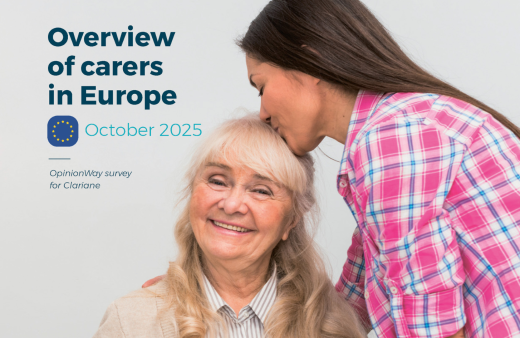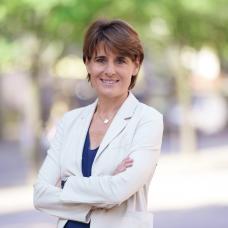Clariane and OpinionWay unveil the first overview of caring in Europe : an essential and demanding role, carried out by more than one in four Europeans

To mark France’s National Carers’ Day, Clariane is publishing the results of an unprecedented survey, conducted with OpinionWay, of 13,500 people in six European countries, which reveals that 28% of respondents provide care to someone close to them.
The study provides an accurate picture of Europe’s non-professional carers, the millions of people who care for a loved one with impaired independence.
More than one in four Europeans affected
- 28% of Europeans say they regularly care for a loved one with impaired independence. These carers have an average age of 47, and the majority are in work (71%) and urban residents (55%).
- There are significant differences between countries in northern and southern Europe: from 23% in Germany to 34% in Italy and 35% in Spain.
- A quarter (24%) of French people report being carers.
Primarily family-focused care
- In nearly 9 out of 10 cases, carers care for a family member, most often a parent or grandparent (59%).
- In France, 61% care for a parent or grandparent. In comparison, this proportion rises to 68% in Spain, while in the Netherlands, nearly a quarter (23%) of carers support someone outside their family (such as a neighbour or friend).
Why do they provide care? Age (84%) and illness (78%) are the main reasons, while disability is placed third (53%).
The multifaceted and demanding nature of caring
- Carers devote an average of 13 hours a week to their loved ones, almost two hours a day.
- They provide multiple types of care:
- practical (73%): shopping, travel and everyday organisation,
- psychological (59%),
- administrative (54%),
- physical (40%): toileting, dressing and providing daily care,
- financial (22%). - In France, administrative (60%) and psychological care (62%) are more pronounced than average. On the other hand, physical care is less common (26% versus 40% in Europe), a sharp contrast with Italy and Spain where more than half of carers (54%) provide this type of care.
A strong personal commitment
- 8 out of 10 carers are solely responsible for the bulk of the care provided. 84% consider this commitment a choice and 9 out of 10 take pride in it.
- France follows a similar trend, with the overwhelming majority proud to provide care (90%), while more than half are happy to care for their loved one.
---
Please find here, the entire version of the study : https://www.clariane.com/en/press-room/kits-and-publications/overview-of-carers-in-europe-opinionway-survey-for-clariane
Les résultats de cette étude confirment le rôle essentiel des aidants à travers l’Europe : plus d’une famille sur quatre est directement concernée. Cet engagement, à la fois considérable et trop souvent silencieux, appelle une reconnaissance plus forte de leur contribution et nous invite collectivement à renforcer le soutien qui leur est dû.



